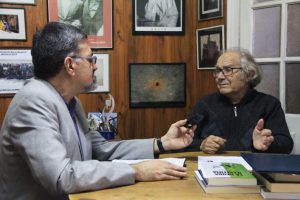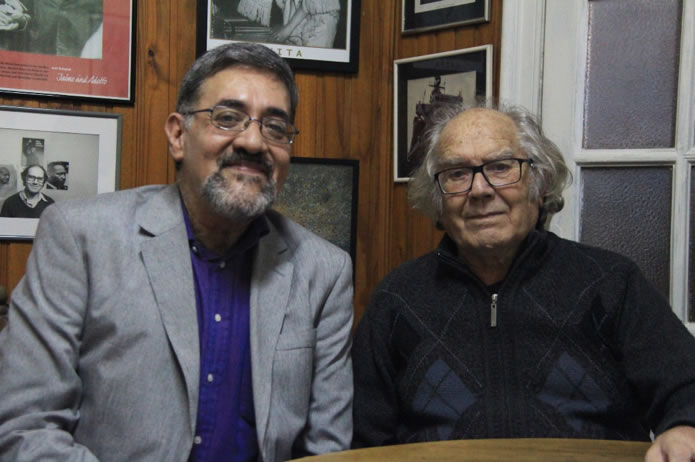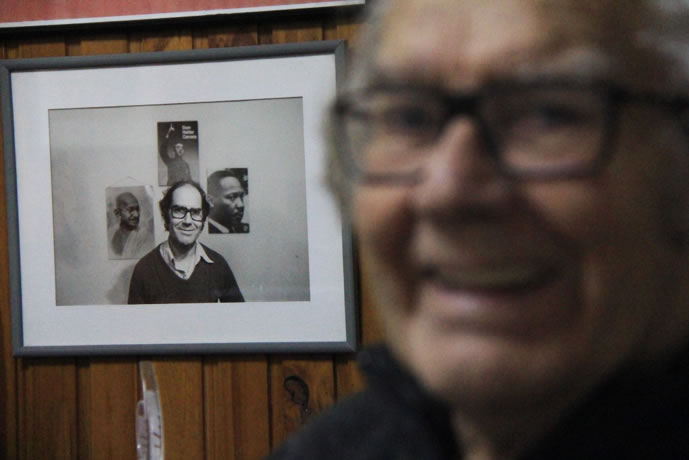
Interview with Adolfo Pérez Esquivel
 An important reference for many generations on the defence of human rights and the promotion of a full and dignified life, Adolfo Pérez Esquivel is undoubtedly an enlightened being with a rich spiritual life. His hope enables him to boldly foresee what has yet to happen, like someone who anticipates what the next steps on the path to an uncertain future will be. It is part of the prophetic work that Adolfo P. Esquivel has been doing for decades as the president of SERPAJ (Servicio Paz y Justicia) in Argentina.
An important reference for many generations on the defence of human rights and the promotion of a full and dignified life, Adolfo Pérez Esquivel is undoubtedly an enlightened being with a rich spiritual life. His hope enables him to boldly foresee what has yet to happen, like someone who anticipates what the next steps on the path to an uncertain future will be. It is part of the prophetic work that Adolfo P. Esquivel has been doing for decades as the president of SERPAJ (Servicio Paz y Justicia) in Argentina.
In his small office in Servicio Paz y Justicia’s building in the legendary San Telmo neighbourhood in Buenos Aires, Adolfo greets us with a big smile, light steps, a firm handshake and hug, like someone who pretends that his 90 years of age are just another fact that gets lost in the vivid testimonies that smell a bit like nostalgia from Buenos Aires and a bit like dreams that are yet to be born.
Leonardo Félix • Who is Adolfo Pérez Esquivel in 2019?
Adolfo Pérez Esquivel • A human being who continues to fight for his fellow humans. That’s all, which is a lot.
LF • You have a long history of fighting for human rights on the continent, for which you have been given several awards and recognition, including a Nobel Peace Prize (1980), during a very turbulent time in our recent past.
APE • First of all, one should not seek to win awards, of any kind. The work we do, we do out of solidarity. I do it out of faith and social, cultural and non-partisan political commitment. I try to share two things: the bread that nourishes the body and the bread that nourishes the spirit. And freedom. I will not resign myself to slavery.
LF • This is related to something we want to ask you: how do your faith and your religious ties contribute to your commitment to defending democracy?
APE • I have always believed that the gospel is not just another thing to read. It is a condition of life that one assumes and tries to put into practice. The link between my faith and democracy is fundamental. It is what sustains me.
LF • Where does your faith come from, Adolfo?
APE • I was born in the legendary San Telmo neighbourhood, very close to another famous neighbourhood in Buenos Aires, La Boca. I am from a tenement house. My father was an immigrant fisherman and my mother was the daughter of a Guarani indigenous women from the province of Corrientes11. Part of the Mesopotamia region in Argentina, along with the provinces of Misiones and Entre Ríos.. This region was full of immigrants and former slaves. Our playmates were other immigrants and descendants of slaves.
I grew up with the Franciscans at the Colegio San Francisco. When my mother died, I ended up in an orphanage for boys, where I stayed with the Carmelite nuns in the Patronato Español until the age of 10. I always tried to see and discover what God was and is in my life.
LF • Is your desire to know God’s place in your life related to “non-violence”, which is a cause that you continue to fight for?
APE • When I was a boy, I would sell newspapers on the streets of my neighbourhood to earn a living. I would take the trolley car to Plaza de Mayo22. The public square where the Casa Rosada, the residence and office of the president of Argentina, is located. and there was a man there who sold used books. One day, he said to me, “here kid. I have two books for you: one is a gift and you can pay me for the other one when you can”. The book that was a gift was Mahatma Gandhi’s autobiography, The Story of My Experiments with Truth, and the one that I had to pay him for was The Seven Story Mountain by Thomas Merton, Gandhi’s friend. Later, I fell in love with the gospels, the Sermon on the Mount, which is where non-violence is clearly affirmed. Phrases such as “love thy neighbour as thyself” had an impression on me. And, obviously, what I read on Gandhi deeply moved me. The idea that what is common to all religions is love and respect for human beings continues to be valid in my life, just as non-violence as a means to make demands and defend life is.
I have also gone through some very powerful experiences. I was arrested on April 4th, 1977, the first day of the Holy Week that year. I don’t believe in coincidences: Martin Luther King (the Baptist preacher in the United States) was assassinated on the same date in 1968. So, I was arrested on a very special day.
In the midst of the strong, nauseating smell of my tiny prison cell, where I had to yell for a really long time to get them to let me out to go to the bathroom, I found “God does not kill” written on the wall. These words, written by a prisoner that I only knew spiritually, were etched in my mind forever.
I was held there for 32 days and they took me on one of the “death flights”33. “Death flights” is a practice used by Argentina’s armed forces, which consisted of taking victims of torture and illegal detentions on airplanes and throwing them out of the planes into the Plata River from high altitudes while they were drugged or semi-conscious. According to Pérez Esquivel, this incident occurred on May 5, 1977.. I was chained to a seat at the back of the airplane. Being a good navigator, I recognised the route we were taking, which went from the Luján River, over Martín García Island and I could make out Montevideo (Uruguay) in the distance. In the end, they were unable to throw me out of the airplane thanks to the enormous international solidarity and the campaign people were organising in Europe and other places for my release.
LF • Tell us a little about Servicio Paz y Justicia en América Latina (SERPAJ). What is it? How was the organisation born and what is its importance and impact in the region?
APE • SERPAJ was born ecumenically. People from the Methodist Church in Argentina, such as Methodist bishops Federico Pagura, Carlos Gattinoni and Aldo Etchegoyen, together with Brazilian Catholics Dom Hélder Câmara and Antonio Fragoso and the bishop of Riobamba, Leonidas Proaño (the bishop of the Indians), made it possible. With their support, I assumed the responsibility of leading this movement, which Federico Pagura in Mendoza had been forming for years. In the early 1970s, we began to help refugees arriving from Chile and we created the CAREF.44. CAREF is the Argentine Commission for Refugees and Migrants. It was created in 1973 in Argentina to assist the large number of Chilean refugees fleeing the Augusto Pinochet dictatorship. In 1974, they put me in charge of coordinating this experience at the continental level.
I believe that SERPAJ’s work is to build networking. Knowing that the problem experienced in one place is everyone’s problem is our strength. When vulnerable groups are isolated, it puts their lives in danger. Therefore, despite the peculiarities of each SERPAJ on the continent, the active defence of human rights based on non-violence is our distinguishing trait.
LF • What was the most important or significant role of the Theology of Liberation in Latin America?
APE • The Theology of Liberation had a major impact on the continent. After the Second Vatican Council (1962-1965) and the Second General Conference of the Latin American Episcopate in Medellín (1968), many Catholic communities returned to the towns or slums and rediscovered the space for liberation through God together with the poor, their struggles and dreams. As Peruvian Catholic theologian Gustavo Gutiérrez says, the Liberation Theology is about “drinking again from the sources of living water”.
LF • In your opinion, what should be the role of religion in the public sphere and what is the biggest challenge that religions face today in a global context marked by conservatism and fundamentalism?
APE • First, a brief analysis. To stop the Theology of Liberation from advancing, Reagan created the Institute of Religion and Democracy during his government, from which many of theses fundamentalist movements emerged with their alienating, individualist, non-community-oriented religions. This differs from public testimony of Jesus, who created community based on his apostles. And I’d add the proviso that in the middle of so many male apostles, they forgot one fundamental women apostle, Maria Magdalena, and the other women to whom Jesus appeared after resurrection.
LF • Do you believe that there is a link between the public role of religion and feminist groups in Latin America that needs to be rediscovered?
APE • Currently, the women’s movement is a non-violent struggle that changes society radically, like mighty rivers that overflow and transform reality. It is one of the great hopes for transforming our social and political reality.
LF • Based on your experience, what advice would you give to human rights defenders today?
APE • One very simple thing: do not stop smiling at life. The day they stop smiling is the day they have been defeated. Social resistance is also cultural in the sense that we know we are not here in vain, only to survive. We are here to learn to live. Mother Teresa of Calcutta led me to realize that love is the great revolution and the women’s movements have a lot of it. I celebrate this and it fills me with hope about what is to come.


Photos by Gabriela Felix
Interview conducted in June 2019 by Leonardo Daniel Félix
Translated by Karen Lang